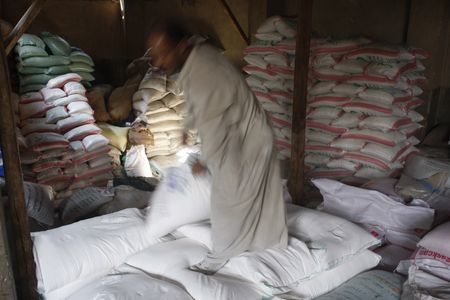By Sarah El Safty
CAIRO (Reuters) – Russia’s invasion of Ukraine has left Egypt’s wheat import prospects in turmoil, with two cargoes purchased by Egypt’s state buyer stuck at Ukrainian ports, other deliveries at risk, and prices soaring, traders say.
However, Egypt’s reserves mean it is not in a rush to buy as it assesses prices of the grain from outside Ukraine and Russia, the deputy supply minister said in an interview.
Egypt is often the world’s top importer of wheat. Last year, some 50% and 30% of state and private sector imports came from Russia and Ukraine respectively, according to traders.
Purchases by Egypt’s state buyer, the General Authority for Supply Commodities (GASC), go towards heavily subsidised bread available to more than 60 million Egyptians.
The government says it intends to reform the programme as it tries to limit its import bill, but has yet to announce a plan.
GASC has cancelled two tenders since Russia’s invasion. It cancelled the first because of a lack of bids, was “testing the water” to assess prices with the second, and was in no rush to buy, Ibrahim Ashmawy, deputy supply and internal trade minister, told Reuters.
For future imports this year, “we will look into EU because of proximity but we will not exclude other exporters like the U.S., Kazakhstan, Romania,” he said.
However, he said Egypt was confident in existing reserves and in the quantity of wheat that would become available from the local harvest, which could suffice for nine months.
The government is still discussing with Citibank, as well as other unnamed banks, options for hedging against commodity price fluctuations, though Ashmawy said it might “not be the best time ever to hedge when prices are very volatile.”
Since the invasion, one cargo of Ukrainian wheat purchased by GASC for Feb.
15-March 3 shipment was able to leave port with 42,700 tonnes of the 60,000 tonnes that had been booked, data from Egypt’s Transport Ministry showed.
But two other cargoes totalling 120,000 tonnes and purchased in December are stuck in port, according to the data.
GASC has purchased another 300,000 tonnes of Ukrainian and Russian wheat as well as 120,000 tonnes of Romanian wheat for shipment in March.
A further 180,000 tonnes of Romanian wheat is booked for April.
GASC has agreed to extend the shipment deadline for at least one cargo stuck in Ukraine, and has said it would be flexible over documentation provided by suppliers, one trader said.
“The situation changes from one hour to the other,” said Ashmawy.
“We don’t know what’s going to happen to the vessels, but we do have our negotiations.”
If a supplier is unable to execute a purchase they must look for an alternative origin since GASC contracts do not include a force majeure clause, but this would be complicated by higher prices and volatile futures, traders said.
“Most suppliers and traders want to be on hold for 10 days or two weeks in order to comprehend the situation with the futures,” said one trader. “It’s very messy right now.”
(Reporting by Sarah El Safty; Writing by Aidan Lewis; Editing by Bernadette Baum)








